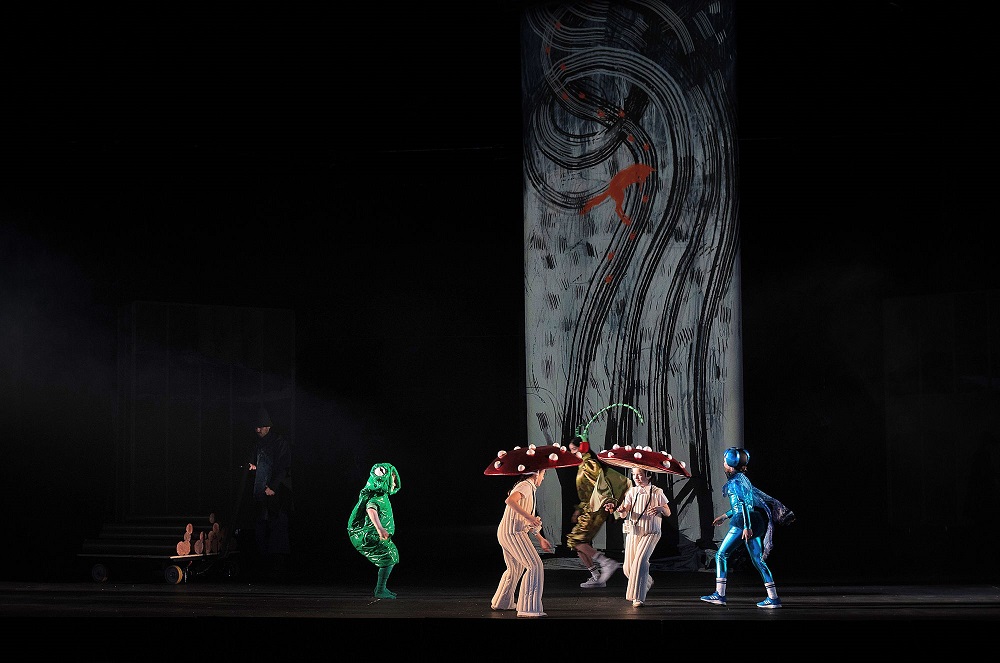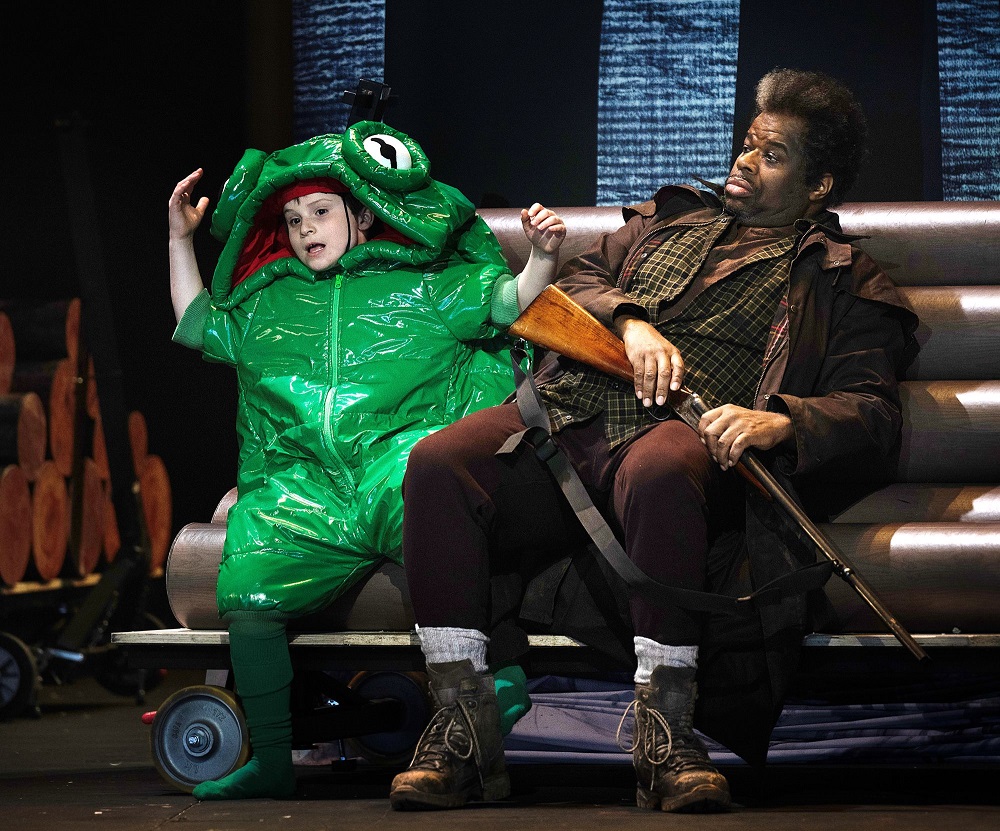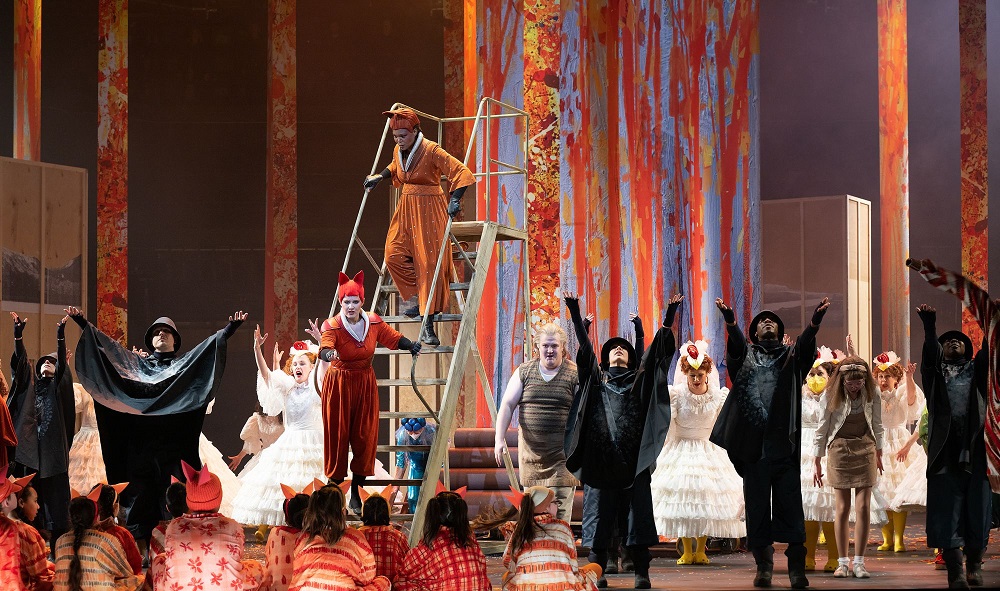Nature in the form of Storm Eunice stopped this Cunning Little Vixen in her tracks on Friday evening. ENO shrugged off the cancellation and rescheduled for Sunday afternoon. And here we were, getting the essential message that humans must reach an accommodation with the natural world or die in despair. So much for a cute animal fable.
Director Jamie Manton understands the essence in the nearly-70-year-old Janáček’s fashioning of this trickiest-to-stage opera from Rudolf Těsnohlídek’s newspaper stories about a vixen with human qualities: in the composer’s own words, “I caught the Vixen for the forest and for the sadness of the late years”. Chief actor in the poetic realization of a fable that veers between vibrant youth and troubled old age is the artwork of Anya Allin on the rolling scroll that’s central to Tom Scutt’s ingenious designs (what fun the fly agaric mushrooms - two of them pictured below with other natural inhabitants and Allin's scroll- and Claire Barnett-Jones' Lapak the Dog must be having).. Allin takes us on a fabulous journey from the foetus in the womb to adulthood, a bright orange Munchian sun (colour-co-ordinated with the foxes, of course), winter, the sexagenarian decade and then beyond to transcendence.  Unfortunately the acting propensities of the scroll are much more focused than anything else on stage. After the brilliance of Brno National Opera director Jiří Heřman’s fantastical riff on life in the orphanage which Těsnohlídek set up in the country town of Bílovice nad Svitavou, much the best production of the Vixen I’ve ever seen, we’re back to kids and older actors in cutesy animal costumes: fine if they were more tautly choreographed. But there’s no real dance in Jenny Ogilvie’s movement direction other than the gestures of an ancient dragonfly (Joy Constantinides). Yes, we see younger incarnations of the leading human, the Forester, as well as of his catch the Vixen who later gets away, but the energy doesn’t flow evenly as it does in Janáček’s score.
Unfortunately the acting propensities of the scroll are much more focused than anything else on stage. After the brilliance of Brno National Opera director Jiří Heřman’s fantastical riff on life in the orphanage which Těsnohlídek set up in the country town of Bílovice nad Svitavou, much the best production of the Vixen I’ve ever seen, we’re back to kids and older actors in cutesy animal costumes: fine if they were more tautly choreographed. But there’s no real dance in Jenny Ogilvie’s movement direction other than the gestures of an ancient dragonfly (Joy Constantinides). Yes, we see younger incarnations of the leading human, the Forester, as well as of his catch the Vixen who later gets away, but the energy doesn’t flow evenly as it does in Janáček’s score.
Or ought to. And here, for me, is the most serious weakness of the evening. Martyn Brabbins treats the utterly original Janáček as if he were only one step on from Wagner – whose The Valkyrie Brabbins conducted so well earlier in the season. The score glows, but moves along so sluggishly that the singers have to declaim rather than dart more nimbly and speech-melodically around the orchestra (a poorly-stressed translation doesn't help). That almost works with Lester Lynch’s charismatic but too stentorian Forester (pictured below with Robert Berry-Roe's Frog) in the philosophy of the great final scene, but not elsewhere. The chorus aren’t the only participants who clearly want to move on faster than Brabbins is prepared to let them.  So Sally Matthews can’t be as agile as we – or presumably she – would like. More bounce would help get the words across, though vocally she’s radiant, and meshes well with another fine soprano, Pumeza Matshikiza, in the courtship scene of the Fox and the Vixen (but again, please, conductor, it’s not a Strauss duet).
So Sally Matthews can’t be as agile as we – or presumably she – would like. More bounce would help get the words across, though vocally she’s radiant, and meshes well with another fine soprano, Pumeza Matshikiza, in the courtship scene of the Fox and the Vixen (but again, please, conductor, it’s not a Strauss duet).
The Forester’s drinking companions the Priest and the Schoolmaster, ripe for disappointment, are vividly projected by Clive Bayley (doubling as the Badger evicted by the Vixen) and Alan Oke (also Mosquito). But Manton’s confusing idea to let the bridalwear hens be emancipated rather than despatched by the Vixen, and then to have them pose in brothel-boxes to hoodwink the drunken men as they head home defuses the idea that it's the woman-into-fox or vice-versa who becomes enmeshed in human fantasies. Didn’t work for me. The wedding celebration at the end of the Act Two is a blaze of colour, though, livened up by the introduction of the couple’s innumerable brood who usually only appear in the last act (scene pictured below).  Another kick into proper life comes in the shape of excellent young bass-baritone Ossian Huskinson’s poacher. But the accidental shooting scene is messy, like most of the ensemble business, and yesterday afternoon the oboe’s poignant reiteration of the Vixen’s “Wait until next May” theme after her death, failing to wait, wrecked the bittersweetness of the interlude. Still, the ending – a second death in the act, as Janáček implied – makes for the usual exultant tearfulness. The assorted children and adolescents, part of ENO Engage's work with Westminster primary schools, add huge fun and value to the whole experience. If you’re not too wide of the mark in terms of the big message, and Manton isn’t, then even a hazy execution can’t destroy it.
Another kick into proper life comes in the shape of excellent young bass-baritone Ossian Huskinson’s poacher. But the accidental shooting scene is messy, like most of the ensemble business, and yesterday afternoon the oboe’s poignant reiteration of the Vixen’s “Wait until next May” theme after her death, failing to wait, wrecked the bittersweetness of the interlude. Still, the ending – a second death in the act, as Janáček implied – makes for the usual exultant tearfulness. The assorted children and adolescents, part of ENO Engage's work with Westminster primary schools, add huge fun and value to the whole experience. If you’re not too wide of the mark in terms of the big message, and Manton isn’t, then even a hazy execution can’t destroy it.














Add comment